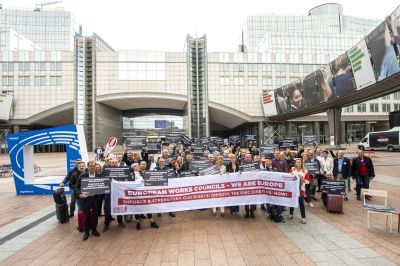The European Commission today presented its proposal for a revision of the directive on European Works Councils (EWCs), the voice of workers in multinational companies.
The proposal clarifies the decisions over which the EWCs must be consulted; management must finalise any consultation before taking a decision; EWCs must get adequate funding.
However, the directive still requires penalties strong enough to stop companies violating these rights, should be extended to franchises to ensure that companies like McDonalds have to be covered by an EWC, and ensures at least one EWC advisor is a trade union representative.
Workers’ voice matter in multinationals
European Works Councils (EWCs) are established to give workers a voice in large multinational companies in which important strategic decisions are no longer made locally or even nationally, but in their company’s European headquarters.
EWCs are meant to ensure that, despite the increasingly international nature of the economy, workers’ rights to information and consultation about the management decisions are upheld.
However, the current EWC directive does not provide for timely information nor for meaningful consultation, let alone for dissuasive and proportionate sanctions in case of breach by multinationals. For example, the maximum fine in Germany is just 15,000 Euro, and has no deterrent effect to a company with a billion Euro turnover.
The European Parliament voted in February 2023 in favour of strengthening the EWCs directive.
Commenting on the proposal for a revised EWC directive, ETUC Deputy General Secretary Isabelle Schömann said:
“The current directive does not live up to the obligations it should deliver. It is a toothless tiger that multinational companies continue to abuse to flout workers’ rights to information and consultation.
“A stronger directive is urgently needed. The enforcement of information and consultation rights of workers are central to making a successful transition to a green and digital economy for both workers and companies.
“The evidence shows that workers are more likely to report positive impacts of artificial intelligence if there has been a process of consultation through their unions and that companies with effective worker participation are more competitive in the long term.
“Today’s proposal is a key step for reassuring European Works Councils members that the European Union delivers for workers, that their voices matter, that the effective exercise of democratic rights by workers do not stop at the company gates."
The next step will give Parliament and Council the possibility to work on further improvements. Rest reassured of the ETUC strong mobilisation to steer them in the right direction.
Notes
Background information on European Works Council: https://www.etuc.org/en/democracy-thematic/european-works-councils
ETUC response to the second-phase consultation of Social Partners under Article 154 TFEU on a possible revision of the European Works Council Directive (2009/38/EC)

